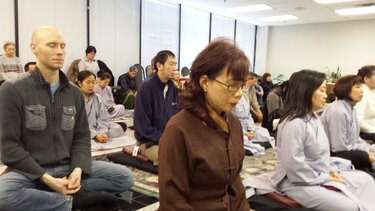At DMC, we teach tranquility meditation (Samatha Bhavana) and insight meditation (Vipassana), emphasizing compassion, self-acceptance, noble discipline, and wisdom. Students gain insight into the cause and effect connection between internal and external reality. Through this practice, they purify their mind and adopt a discerning attitude toward life. They strictly observe Sila while they are at the center and become competent in their pursuits with the acquisition of mental calmness, clarity and self-awareness. We offer various programs, seminars, and social events for our members and the public at large.
The modality of Vipassana and Psychotherapy
What is Vipassana?
Vipassana was primarily taught by the Buddha nearly 2600 years ago. The monastic traditions in some southeast Asian countries still maintain this pristine form of meditation method and are increasingly popular around the globe. The word Vipassana derives from an ancient language, Pali, which means “see the true nature of things with wisdom.” That is why Vipassana enables practitioners to realize the true nature of reality experientially. It allows the practitioners to develop self-awareness and cognitive ability; through this practice, one can see, know and experience the change and impermanence with direct knowledge within. This meditative approach includes Saddhā (conviction), Silā (noble disciplines), Samādhi (Concentration) and Pāññā (Wisdom) that incorporates the fourfold Dhamma factors of the noble teaching of the Enlightened One leading to freedom from suffering. Research has shown that Vipassana meditation reduces chronic mental disorders, enhances tolerance to anxiety and depression, and increases calmness, attention, perceptive ability and life sensitivity. It also heightens neuroplasticity changes underpinning cognitive processes and cognitive restructuring and improves the quality of life. Therefore, researchers have recognized Vipassana meditation as an effective technique for enhancing subjective well-being among practioners in all works of life, and that offers to prevent psychoneurological disorders. Thus, the Vipassana approach is preventive and curative healthcare and experience-based dynamic psychotherapy.
What is Vipassana?
Vipassana was primarily taught by the Buddha nearly 2600 years ago. The monastic traditions in some southeast Asian countries still maintain this pristine form of meditation method and are increasingly popular around the globe. The word Vipassana derives from an ancient language, Pali, which means “see the true nature of things with wisdom.” That is why Vipassana enables practitioners to realize the true nature of reality experientially. It allows the practitioners to develop self-awareness and cognitive ability; through this practice, one can see, know and experience the change and impermanence with direct knowledge within. This meditative approach includes Saddhā (conviction), Silā (noble disciplines), Samādhi (Concentration) and Pāññā (Wisdom) that incorporates the fourfold Dhamma factors of the noble teaching of the Enlightened One leading to freedom from suffering. Research has shown that Vipassana meditation reduces chronic mental disorders, enhances tolerance to anxiety and depression, and increases calmness, attention, perceptive ability and life sensitivity. It also heightens neuroplasticity changes underpinning cognitive processes and cognitive restructuring and improves the quality of life. Therefore, researchers have recognized Vipassana meditation as an effective technique for enhancing subjective well-being among practioners in all works of life, and that offers to prevent psychoneurological disorders. Thus, the Vipassana approach is preventive and curative healthcare and experience-based dynamic psychotherapy.
| the_observance_of_five_training_rules.pdf | |
| File Size: | 69 kb |
| File Type: | |
|
Click Meditation Calendar and join a session.
|
|
Copyright © 2017 Dhammanjali Meditation Center - All rights reserved

